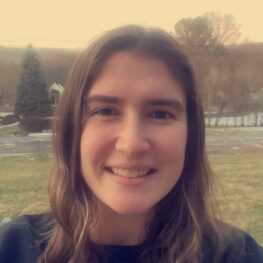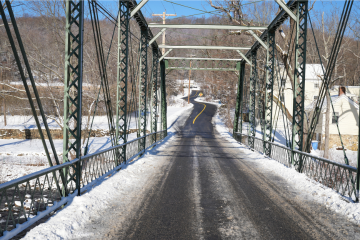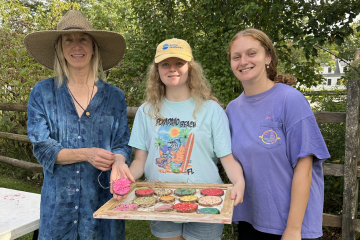 If there’s anything you ever wanted know about the region of New Jersey known as the upper Raritan River watershed – its network of rivers and streams, the flora and fauna that call it home, what residents can do to keep its waters clean – just ask Stevie Ader. Seriously!
If there’s anything you ever wanted know about the region of New Jersey known as the upper Raritan River watershed – its network of rivers and streams, the flora and fauna that call it home, what residents can do to keep its waters clean – just ask Stevie Ader. Seriously!
As this year’s AmeriCorps “Watershed Ambassador” assigned to the nonprofit Raritan Headwaters Association (RHA), Ader’s main responsibility is to educate and involve the public in protecting the 470-square-mile watershed region in Hunterdon, Somerset, and Morris counties.
She’s busy filling her calendar with speaking engagements before students, scouting groups, community organizations and more. Topics include what is a watershed, how to build a rain garden, overall stream health, and how to identify insects that are indicators of good water quality.
“I really enjoy the environmental education aspect,” said Ader, a Califon resident. “I’ll do presentations in person, virtually, outdoors, or indoors.”
She’s also out and about in local towns, organizing environmental projects, and monitoring the health of local waterways. She recently held a volunteer workday to remove invasive plants at RHA’s Fairview Farm in Bedminster.
Lifelong Environmental Interest
Ader has always been drawn to nature and the outdoors. As a child, she attended nature camps at New Jersey Audubon’s Scherman Hoffman Sanctuary in Bernardsville, and later was both a camper and intern at a marine science camp at Sedge Island Natural Resource Education Center on Barnegat Bay.
After graduating from Voorhees High School in 2017, she attended Stockton University and earned a BS degree in environmental science, with a concentration in wildlife management.
“Basically, I’ve always been interested in the environment,” she said. “I knew that was the direction I wanted to take.”

The 2021-2022 class of AmeriCorps Watershed Ambassadors helped clear invasive species on Fairview Farm.
Before coming to RHA, she had an internship with the South Jersey Transportation Authority, which operates the Atlantic City Expressway. She helped with the Authority’s ecological projects along the highway – including putting up bird boxes, monitoring osprey nests, and planting native trees, shrubs, and wildflowers.
Ader also worked as a wildlife technician for the Atlantic County Utilities Authority, documenting bird species at the county landfill and using fireworks to discourage flocks from flying near the runways at the adjoining Atlantic City Airport. “It was long days sitting on top of the county landfill, but it was interesting,” she said.
She learned about the AmeriCorps Watershed Ambassadors program from Bill Kibler, RHA’s policy director and a fellow Califon resident. She applied for a position and was chosen to serve the upper Raritan region, known as Water Management Area (WMA) 8, for one year.
She started in October and said she loves working with the RHA staff. “The best thing about this job is you literally learn everything,” said Ader, who will work at RHA through August.
Ambassador Program turns 22
Founded in 2000, the Watershed Ambassadors program is administered by the New Jersey Department of Environmental Protection. Its goals are to promote watershed stewardship through education and direct community involvement, and to monitor stream health through performing visual and biological assessments. One AmeriCorps member is assigned to each of New Jersey’s 20 watershed management areas. Terms are one year, with the option of renewing for a second year.
Raritan Headwaters has a long history with the Watershed Ambassadors program. Every year since 2000-01, RHA has hosted a Watershed Ambassador. Three have gone on to staff positions with RHA: Education director Lauren Theis (Class of 2007-08), watershed scientist Mara Tippett (Class of 2015-16), and Shealynn O’Toole (Class of 2019-20), development associate and well test assistant.
Former RHA trustee Ken Klipstein is one of a group of NJ Department of Environmental Protection staff members who founded the Watershed Ambassadors program.
“If there’s one single accomplishment that I take the most pride in, it’s establishing the Watershed Ambassadors program,” he said.
“There have been 400-plus ambassadors now, 22 years later,” added Klipstein, who is now with the NJ Water Supply Authority. “It’s been fabulously successful not just in educating people about watersheds, but also in recruiting people. It became a great feeder system for (environmental) nonprofits and agencies to hire qualified people.”



